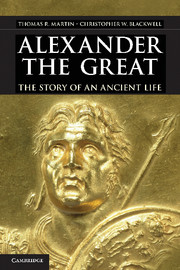Book contents
- Frontmatter
- Contents
- Acknowledgments
- Introduction: The Goal of this Book
- Map 1: European Greece, Macedonia, and Northern Lands
- Map 2: Alexander's Expedition
- 1 The World of Alexander's Birth and His Education in Literature and Warfare (350s and 340s BC)
- 2 Opportunities and Risks asa Teenager (340s to 338 BC)
- 3 The Danger in Replacing a Murdered Father as King (337 to 335 BC)
- 4 The Opening Battles Against the Persian Army (334 to 332 BC)
- 5 Finding God in Egypt and Capturing the Riches of Persia (332 to 330 BC)
- 6 Winning the World as King of Asia (330 to 329 BC)
- 7 Murder, Marriage, and Mixing Customs in Afghanistan (329 to 327 BC)
- 8 Victory and Frustration in India (327 to 326 BC)
- 9 Returning to Babylon and Becoming Divine (326 to 323 BC)
- 10 Remembering and Judging Alexander (323 BC to Now)
- Suggested Readings
- Index
5 - Finding God in Egypt and Capturing the Riches of Persia (332 to 330 BC)
Published online by Cambridge University Press: 05 November 2012
- Frontmatter
- Contents
- Acknowledgments
- Introduction: The Goal of this Book
- Map 1: European Greece, Macedonia, and Northern Lands
- Map 2: Alexander's Expedition
- 1 The World of Alexander's Birth and His Education in Literature and Warfare (350s and 340s BC)
- 2 Opportunities and Risks asa Teenager (340s to 338 BC)
- 3 The Danger in Replacing a Murdered Father as King (337 to 335 BC)
- 4 The Opening Battles Against the Persian Army (334 to 332 BC)
- 5 Finding God in Egypt and Capturing the Riches of Persia (332 to 330 BC)
- 6 Winning the World as King of Asia (330 to 329 BC)
- 7 Murder, Marriage, and Mixing Customs in Afghanistan (329 to 327 BC)
- 8 Victory and Frustration in India (327 to 326 BC)
- 9 Returning to Babylon and Becoming Divine (326 to 323 BC)
- 10 Remembering and Judging Alexander (323 BC to Now)
- Suggested Readings
- Index
Summary
In the autumn of 332, the Macedonian army marched southward along the coast from Tyre. All of the cities on his route surrendered without a fight, except one. Battis, the eunuch whom the Persian king had put in charge of Gaza, refused to allow Alexander to enter his city; he had stored food and hired Arabian mercenaries to withstand a siege. Alexander could easily have bypassed Gaza. The city, on a shoal off shore, posed no impediment to his progress or any serious threat from behind once he had passed. But Alexander was fiercely determined in his treatment of enemies. Those who cooperated he accepted as supporters. Those who resisted he destroyed. His view of natural justice, of the proper ordering of the world of human affairs (with himself at its pinnacle), demanded nothing less. When Parmenion told him that Gaza's lofty fortifications rendered it nearly impregnable, Alexander replied that the challenge alone required him to capture it. When Battis sent a secret assassin masquerading as a suppliant, who nearly succeeded in murdering Alexander, the city's fate was sealed. Alexander ordered his engineers to construct siege machines and personally took the leading role in their deployment. He stood so close to the enemy's walls that a catapult on the ramparts shot him with a missile that penetrated his metal armor and lodged in his shoulder. The wound bled profusely, and his friend Philip narrowly saved his life by pulling out the massive arrow. Even as he recovered from this wound, he stood at the front lines and was hit by a stone flung by an enemy's sling.
The city's defiance justified, for Alexander, a merciless punishment when finally he breached its walls. Every male defender of Gaza was killed, and every woman and child was sold as a slave. When Battis was brought before him, Alexander announced that he would be punished with torture. Had Battis pled for mercy, such an admission of inferiority might have appeased the king's sense of honor. But Battis held his tongue, and Alexander's rage increased. His men pierced Battis's ankles with cords and dragged him, still living, behind a chariot. This gruesome spectacle reenacted the scene in Homer's Iliad when Achilles drags the body of the fallen Trojan hero Hector around the walls of Troy. As much as any incident in Alexander's career, the siege of Gaza and the punishment of Battis reveal essential facts of the king's character. When his superiority was denied, his rage was implacable. And in his rage, he expressed himself through the dramatic vocabulary of the heroic Greek literature on which he was raised.
- Type
- Chapter
- Information
- Alexander the GreatThe Story of an Ancient Life, pp. 73 - 92Publisher: Cambridge University PressPrint publication year: 2012



